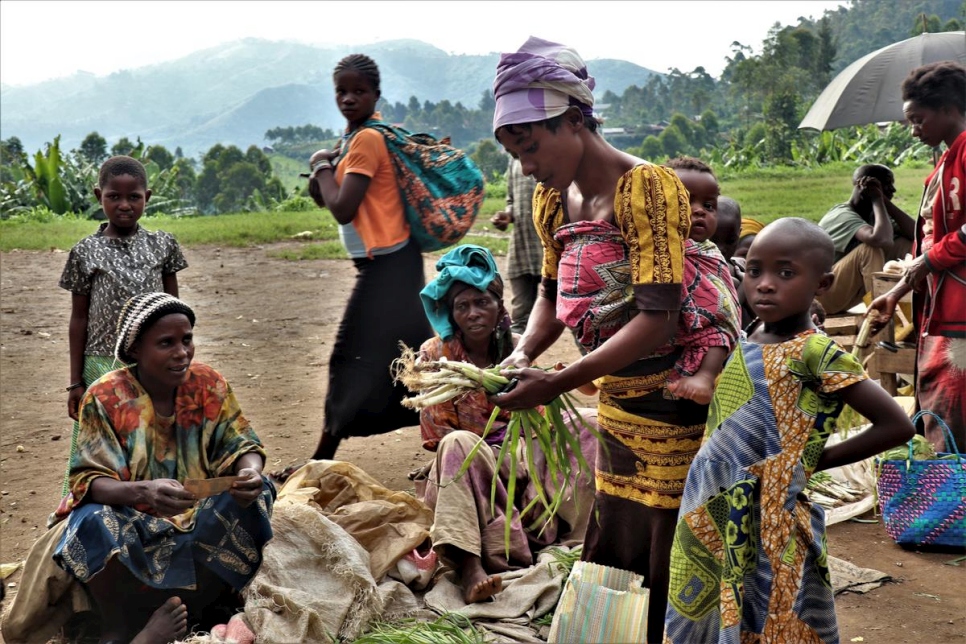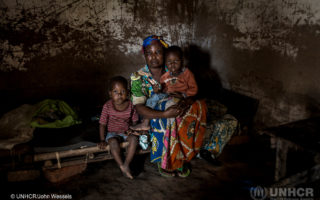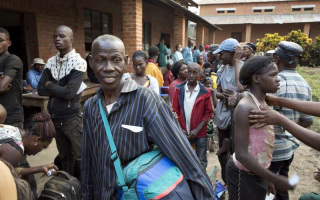
Internally displaced families from North Kivu province arrive at Masisi in the Democratic Republic of the Congo, November 2018. © UNHCR/Ley Uwera
This is a summary of what was said by UNHCR spokesperson Babar Baloch – to whom quoted text may be attributed – at today’s press briefing at the Palais des Nations in Geneva.
Insecurity in the Democratic Republic of the Congo’s North Kivu province led to more than 100,000 people fleeing their homes in April.
As attacks continue to terrorize the population, UNHCR, the UN Refugee Agency, is extremely worried about the safety of civilians. The displaced are in a desperate situation, and access to them is being hampered by the volatile situation.
It is estimated that up to 60,000 people fled in April as a result of fighting around Kamango near the town of Beni. In the same month, an estimated 50,000 people fled in neighbouring Lubero Territory, where the Congolese Army was fighting Mai-Mai armed groups.
While a string of attacks by armed groups within Beni town has now ceased, these have moved to rural areas. Fighting also continues in southern parts of North Kivu and towards the provincial capital of Goma. Kidnappings and killings have traumatized the population. Often, displaced people are the targets. Last week, five mutilated bodies were found in a river in Masisi Territory, around 60 kilometres to the northwest of Goma. The bodies included those of three children. Four of the dead were people who had been kidnapped from Kashuga, a nearby displacement site.
In the same area, over 20,000 newly displaced civilians have arrived over the past months in just three small towns: Mweso, Kashuga and Kirumbu in Masisi Territory.
UNHCR teams visiting the area have received reports of rape, and of child recruitment by armed groups.
DRC’s North Kivu province remains one of the country’s most displacement affected regions with an estimated displaced population of over a million. It also has the highest number of reported incidents of sexual and gender-based violence in the country. The number of reported cases of rape has risen in particular in Masisi Territory.
UNHCR has scaled up its activities in DRC’s provinces of North Kivu and Ituri since August 2018. Among our priorities are supporting people in need of protection, such as survivors of sexual violence. And working with communities to strengthen their capacity to cope with multiple crises plus providing basic shelter to displaced persons and returnees.
However, our response is being affected by a lack of funds for even basic humanitarian support, such as shelter or help for women at risk of sexual violence and exploitation. Of US$47 million needed in 2019 for the response to internal displacement in DRC, UNHCR has received only US$6.2 million in contributions.
For more information on this topic, please contact:
- In DRC, Andreas Kirchhof, kirchhof@unhcr.org, +243 81 700 9484
- In Kampala, Duniya Aslam Khan, khand@unhcr.org, +256 772 701 101
- In Nairobi, Dana Hughes, hughes@unhcr.org, +254 733 44 05 36
- In Geneva, Babar Baloch, baloch@unhcr.org, +41795139549
- In Geneva, Charlie Yaxley, yaxley@unhcr.org, +41 795 808 702
Originally published by UNHCR on 03 May 2019





